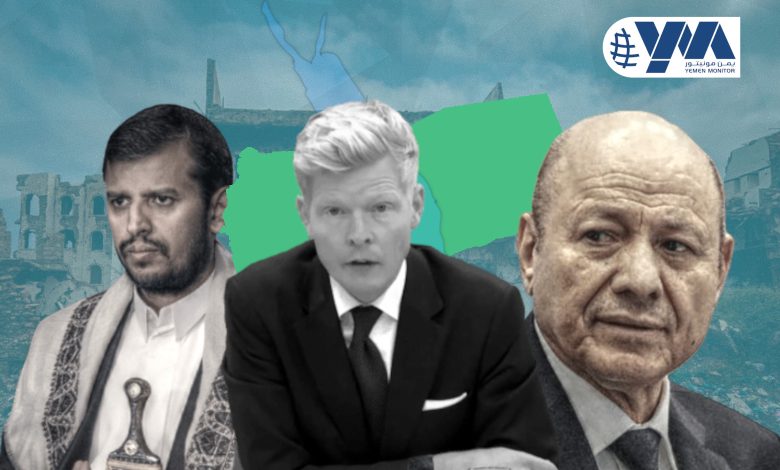Yemen: Grundberg Warns of “Zero-Sum Game”

Yemen Monitor/New York/Special :
The United Nations Special Envoy to Yemen, Hans Grundberg, warned Security Council ambassadors that recent months have seen a “gradual increase” in fighting in several locations, as well as consistent threats by all sides to return to war.
“The question is not if, the parties continue the current escalatory path, but when,” he added in a briefing to the Security Council.
Mediation efforts have stalled in the face of Houthi attacks in the Red Sea, which they claimed were in support of Palestinians facing a brutal Israeli aggression. The situation remains unresolved, with the Houthis increasing their attacks on commercial and military vessels.
The US-led coalition, which defends Red Sea shipping, has continued its airstrikes on Houthi-controlled areas in Hodeidah, the capital Sana’a, and Taiz.
Grundberg also highlighted the precarious situation of civil society and non-governmental organizations (NGOs), as well as the United Nations, which have become targets of a crackdown by the Houthi group.
Last week, the group arrested 13 UN staff members, five staff members of international NGOs, and several national NGOs and civil society organizations. They remain detained incommunicado, in addition to four UN staff members detained since 2021 and 2023 (two each year), respectively.
The Special Envoy said that such arbitrary detentions are not the expected signal from a party seeking to resolve the conflict through mediation.
Zero-Sum
Grundberg Warns of Zero-Sum Game Moves by Parties :Despite commitments made and a roadmap laid out, parties to the conflict in Yemen have reverted to zero-sum game tactics, jeopardizing the implementation of these commitments.
UN Special Envoy Hans Grundberg criticized the parties for prioritizing their own positions over the well-being of the Yemeni people. This has led to actions that undermine the viability of previously agreed-upon commitments.
Grundberg highlighted the economic conflict as a prime example of this zero-sum mentality of the parties . The Houthis initiated this conflict by announcing the introduction of a new currency in areas under their control. The Central Bank of Yemen responded by demanding that banks relocate their headquarters to Aden or face punitive measures. In retaliation, “the Houthi-controlled branch of the Central Bank banned all banks with headquarters in Aden from operating in areas under their control.”
The Special Envoy warned that if banks in Sana’a are cut off from international financial transactions due to punitive measures, the consequences for the economy would be catastrophic. This would disrupt the import of essential goods, including food and medicine, and halt bank remittances.
UN Special Envoy Hans Grundberg expressed concern that recent developments in Yemen, including the economic conflict and sporadic military incidents, could exacerbate divisions, fragment the banking sector, and open the door to potential escalation.
“Overall, these developments will further deepen divisions and fragmentation in the banking sector, while also opening the door to potential military escalation,” Grundberg stated.
Despite these concerning developments, Grundberg emphasized that the current military situation is unsustainable. “If the parties continue on the current escalatory trajectory, the question is not if, but when, they will return to the battlefield,” he warned.
Grundberg reiterated his previous warnings about the gradual increase in fighting over the past months, including reported clashes in Dhamar, Lahj, Marib, and Taiz, as well as the persistent threats of a return to war by all parties.
The outline of the UN-led roadmap for peace in Yemen was agreed upon in early December, but progress has stalled with the Houthis’ escalation of their campaign of attacks in the Red Sea, which they have described as acts of solidarity with Palestine.
The UN-led roadmap reflects consultations between the Houthis and the Saudis last year, with the internationally recognized government not participating in those consultations.
Yemen has been mired in war since the Houthis swept into the capital Sana’a in September 2014. A Saudi-led Arab coalition intervened on behalf of the internationally recognized government in March 2015 to confront the Iran-backed Houthi group. A longest-ever truce began in April 2022. The fighting has killed more than 400,000 Yemenis, according to the UN, displaced millions more, and caused one of the world’s worst humanitarian crises in a country already devastated by decades of conflict





